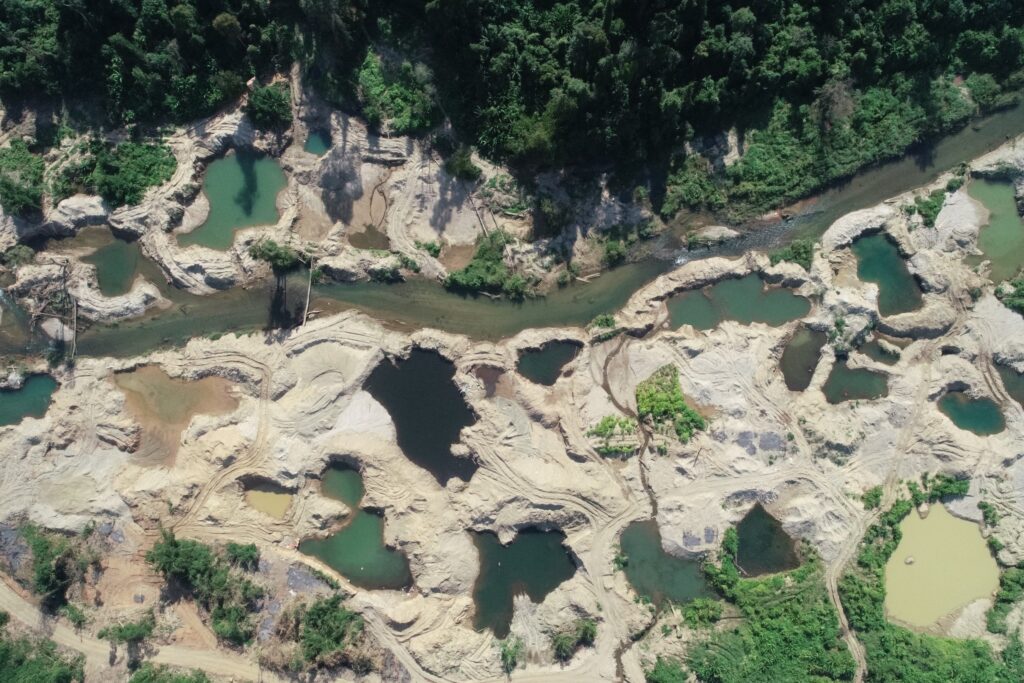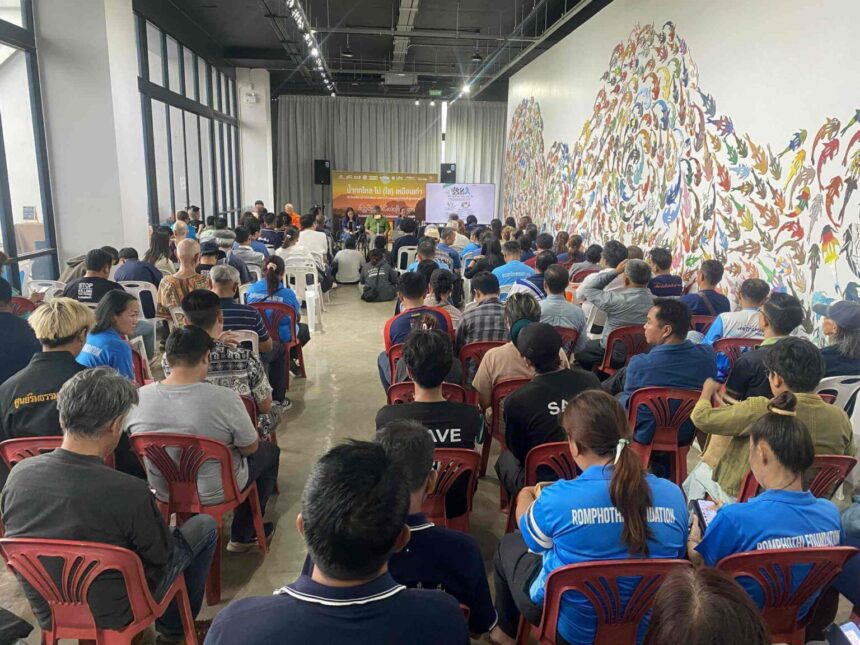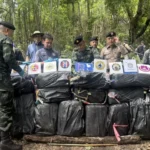CHIANG RAI – On Saturday, people from both Chiang Rai and Thaton, Myanmar, gathered at the Chiang Rai Contemporary Art Museum to raise awareness and press for an end to mining at the headwaters of the Kok and Sai rivers. Concerns focus on heavy metal contamination, which has been found in river water at unsafe levels.
The event opened with music from the Chiang Rai Youth Orchestra, and included stalls from local artists and traditional activities. Many residents from Chiang Rai and the nearby town of Thaton attended to show their support.
The community network working to protect these rivers had invited representatives from the Chinese Embassy to hear local concerns about mining by Chinese companies in Shan State, Myanmar.
However, no representatives attended. Sueb Sakul Kitchanukorn, a lecturer from Mae Fah Luang University and a key organizer, said the embassy claimed it had passed the matter to the consulate in Chiang Mai, but no one from there came either. He mentioned that more events are planned to keep drawing attention to the issue.
Nakhon Pongnoi, an elder from Chiang Rai, spoke at the event, pointing out the importance of tackling heavy metal pollution in the river, as it affects everyone’s lives. He stressed the need to restore clean water for the community.

Mining the Root Problem
Phra Mahanikom, assistant abbot at Wat Thaton in Chiang Mai, said that mining is at the root of the problem. He drew a parallel with Buddhist teaching, saying you must tackle the root cause to really solve an issue, not just the symptoms. He said that only stopping mining will address the true source of river pollution.
Bundit Phanpalakorn, chair of the Wiang Pang Kham municipal council, said the problem in the Sai River has lasted for three years. In the past, water was clean and supported traditional Songkran ceremonies, but now those customs have stopped.
He shared his own experience of getting a skin rash after helping residents during a flood and said there is uncertainty about what is causing it.
He added that tests on shallow wells have found toxins, and he is worried about long-term health risks like cancer. He called for government action and described his frustrations with both Myanmar and Wa authorities, who have given him little help. He also noted that China is the biggest buyer of mined minerals.
A representative from the Department of Water Resources explained their efforts to build sediment traps along the river. Tests found high levels of heavy metals upstream, which dropped after the water passed through these barriers. They suggested that if mining stopped, these barriers could be removed, but until then, they provide some benefit.

Cancer and Birth Defects
Assoc. Prof. Dr. Sitang Pilailar from Kasetsart University shared her experience investigating pollution from gold mining in other parts of Thailand. She described meeting villagers suffering from health problems linked to mining, including cancer and birth defects.
In Phichit, the water supply became so contaminated that authorities banned its use. She said that after public attention faded, support for affected communities dried up, and some court-ordered cleanups never took place.
She pointed out that while there may not yet be visible cases of illness from the Kok and Sai rivers, waiting will only lead to worse outcomes. She warned that toxins build up in people and animals over time and that trust in water safety has eroded.
Dr. Sitang questioned the effectiveness of sediment traps in stopping heavy metal contamination, as many toxins bind to fine particles that pass through. She said the only real solution is to stop pollution at its source, study the spread of contamination, and give medical checks to people using river water. She called for strong action from Thai authorities in talks with China and the Wa group, pointing out that Thailand bears the risks without any benefit.

Mekong River Contamination
Niwat Roikaew, head of the Rak Chiang Khong group, said that metal contamination in the Kok and Sai is spreading to the Mekong basin. He noted that more rare earth mines are opening upstream, which could worsen the problem, especially if new dams are built, as these trap sediment and could turn parts of the Mekong into a toxic reservoir. He urged the government to deal with the source and protect public safety.
Dr. Wirun Limsawat, head of a health research group at the Ministry of Public Health, said money spent on sediment traps would be better used for prevention. As a doctor, he prefers preventing health issues rather than treating them after the fact.
Zau Lawt, an independent Kachin researcher, reported that Kachin State in Myanmar now hosts around 300 rare earth mines, with thousands of mining pits near the Chinese border. Mining operations have recently expanded to Shan State near the Thai border in Mae Sai, Chiang Rai. The Thai Shan Human Rights Foundation has reported new rare earth mines near the Kok River.
Zau Lawt explained that mining these minerals starts with breaking rocks, then pouring chemicals into the pits. This process releases white mineral powder, and the use of chemicals causes severe air and water pollution. He said that in Kachin, an Irrawaddy River tributary has become so polluted that all fish have died, livestock perish after drinking the water, and crops can no longer be sold to China.

Dialogue With China
While he thinks the impact on Thailand is not yet as severe, there are risks from toxic runoff in the rivers, which affects communities and health. He questioned whether barriers or dams can solve the problem, saying the only way forward is for Myanmar to manage its toxic waste or for dialogue with China.
Sayamol Kaiyurawong from the National Human Rights Commission of Thailand pointed out that the country lacks a dedicated human rights court. She has asked the United Nations to include the issue of chemical pollution in the Kok, Sai, and Mekong rivers in their global human rights reports.
Tuenjai Deetes, founder of the Community Development and Mountain Area Foundation, said that while people in Chiang Rai are active, the business sector has yet to join.
She suggested larger, national-level forums and called for direct communication with President Xi Jinping, since China benefits most from the mining. She said China must take responsibility for the impacts on these rivers.














